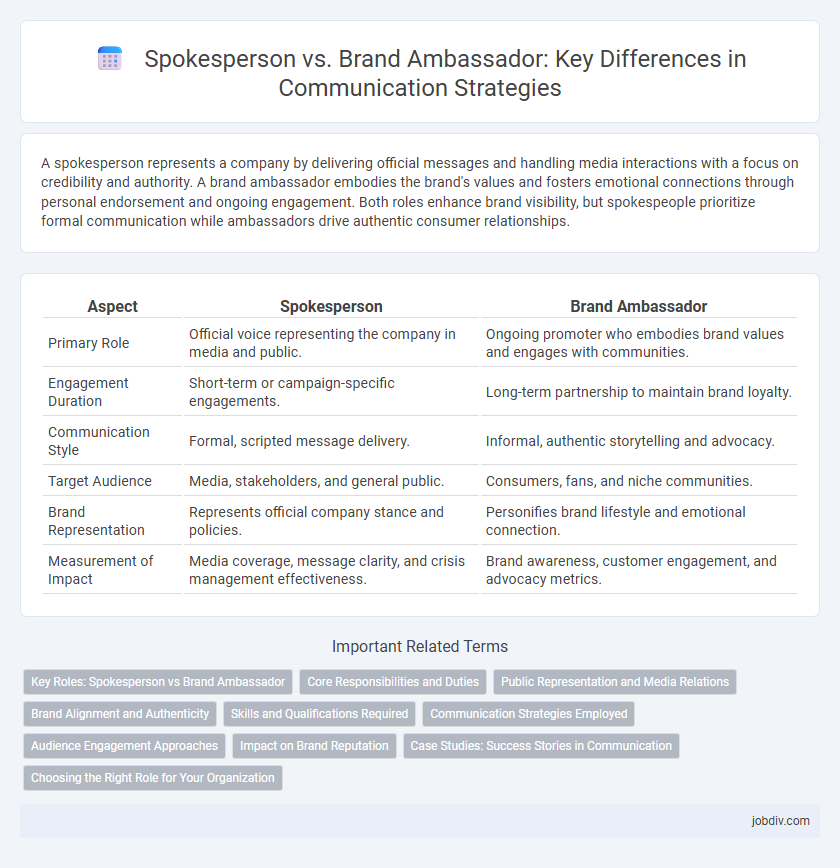A spokesperson represents a company by delivering official messages and handling media interactions with a focus on credibility and authority. A brand ambassador embodies the brand's values and fosters emotional connections through personal endorsement and ongoing engagement. Both roles enhance brand visibility, but spokespeople prioritize formal communication while ambassadors drive authentic consumer relationships.
Table of Comparison
| Aspect | Spokesperson | Brand Ambassador |
|---|---|---|
| Primary Role | Official voice representing the company in media and public. | Ongoing promoter who embodies brand values and engages with communities. |
| Engagement Duration | Short-term or campaign-specific engagements. | Long-term partnership to maintain brand loyalty. |
| Communication Style | Formal, scripted message delivery. | Informal, authentic storytelling and advocacy. |
| Target Audience | Media, stakeholders, and general public. | Consumers, fans, and niche communities. |
| Brand Representation | Represents official company stance and policies. | Personifies brand lifestyle and emotional connection. |
| Measurement of Impact | Media coverage, message clarity, and crisis management effectiveness. | Brand awareness, customer engagement, and advocacy metrics. |
Key Roles: Spokesperson vs Brand Ambassador
A spokesperson primarily serves as the official voice of a company, delivering clear and consistent messages during press conferences, interviews, and public statements to maintain the brand's credibility. In contrast, a brand ambassador embodies the brand's values and personality, engaging with audiences through social media, events, and personal interactions to build long-term emotional connections. Both roles are essential in communication strategies: the spokesperson manages reputation and crisis communication, while the brand ambassador boosts brand awareness and loyalty.
Core Responsibilities and Duties
A spokesperson serves as the official voice for a company, delivering key messages and representing the brand in media interviews, press conferences, and public statements. Brand ambassadors focus on promoting the brand through personal endorsements, social media engagement, and grassroots marketing efforts to enhance brand visibility and loyalty. Both roles require strong communication skills, but spokespeople prioritize authoritative messaging while brand ambassadors emphasize authentic connection with target audiences.
Public Representation and Media Relations
A spokesperson serves as the official voice of a company or organization, delivering precise messages and managing media inquiries to maintain consistent public representation. Brand ambassadors embody the brand's values and personality through authentic engagement with their audience, often leveraging social media platforms to build trust and humanize the brand. Effective media relations require spokespersons to develop strong press connections and deliver clear, controlled communications, whereas brand ambassadors focus on fostering positive customer interactions and enhancing brand visibility.
Brand Alignment and Authenticity
A spokesperson communicates on behalf of a company but may lack deep personal connection to the brand, potentially limiting perceived authenticity. Brand ambassadors embody the brand's values and culture, creating stronger brand alignment through genuine, relatable storytelling. This authentic representation fosters trust and emotional engagement, enhancing overall communication effectiveness.
Skills and Qualifications Required
A spokesperson requires strong communication skills, media training, and the ability to articulate company values clearly under pressure. Brand ambassadors must possess interpersonal skills, social media savvy, and a genuine affinity for the brand to engage target audiences authentically. Both roles demand confidence, public speaking abilities, and a deep understanding of the brand's mission and messaging.
Communication Strategies Employed
Spokespersons leverage authoritative communication strategies to deliver consistent, credible messages that enhance trust and brand reputation through direct media engagement and official statements. Brand ambassadors utilize personal storytelling and authentic social interactions across digital platforms to foster emotional connections and increase brand visibility among targeted audiences. Both roles employ tailored content strategies, but spokespersons emphasize formal communication, while brand ambassadors prioritize relatable, consumer-driven narratives.
Audience Engagement Approaches
Spokespersons typically engage audiences through direct, authoritative messaging that builds trust and credibility by representing a company's core values and expertise. Brand ambassadors foster deeper emotional connections by sharing personal experiences and authentic stories, encouraging community interaction and loyalty. Both approaches leverage tailored communication strategies to maximize audience engagement and brand advocacy.
Impact on Brand Reputation
A spokesperson directly influences brand reputation through authoritative, consistent messaging that builds trust and credibility with target audiences. Brand ambassadors create authentic connections by embodying brand values, often leveraging personal appeal to enhance emotional engagement and positive perception. Both roles significantly shape brand reputation, with spokespersons emphasizing controlled communication and brand ambassadors driving grassroots advocacy.
Case Studies: Success Stories in Communication
Case studies highlight how spokespeople like Katie Couric effectively humanize complex messages, boosting public trust and media engagement for organizations. Brand ambassadors such as Nike athletes leverage authentic personal stories and social media influence to strengthen brand loyalty and drive consumer action. Both roles demonstrate strategic communication success by aligning personal credibility with brand values to maximize audience impact.
Choosing the Right Role for Your Organization
Selecting the appropriate spokesperson or brand ambassador depends on the organization's communication goals, target audience, and desired brand image. A spokesperson typically provides authoritative information and represents the organization's official stance, making them ideal for managing crises or formal announcements. In contrast, a brand ambassador embodies the brand's values and fosters emotional connections through authentic engagement, which is crucial for long-term brand loyalty and consumer trust.
Spokesperson vs Brand Ambassador Infographic

 jobdiv.com
jobdiv.com